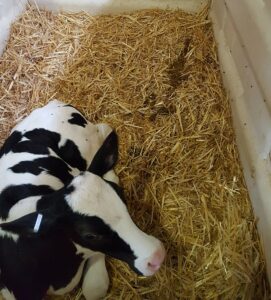

Diarrhea, or scours, kills too many calves. For those heifers that fall ill and don’t die, they tend to experience reduced growth, higher age at first calving, and lower first-lactation milk production. Prevention is always our best bet for managing animal health.
We have learned a lot about how the gut microbiome (all the microbes living in the digestive tract) functions and interacts with its host (here, the calf). Several types of bacteria, when prevalent in feces, have been associated with increased weight gain and lower incidence of diarrhea: good gut bugs! We know early colostrum feeding has many positive benefits; one of them is helping to establish the population of good bacteria. (Feeding waste milk containing residual antibiotics seems to be associated with more frequent imbalances in the gut microbiome.)
Is there something else we can feed calves to help establish/maintain/enhance the gut microbiome? Maybe so? Probiotics are live strains of particular microorganisms (specific fungal or bacterial strains). There have been a fair number of studies that have examined the effects of giving calves probiotic supplementation. These are briefly summarized in the table below.
Table 1. Common probiotics and summarized effects on preweaned calves from a review of scientific studies.
| type of probiotic | effects on growth & performance | effects on health |
| yeast (various forms of product) | > positive or no effect on growth (may depend on yeast product, health status of animal, whether delivered via milk or starter) | > reduced incidence and severity of diarrhea > reduced mortality rate |
| bacterial-based products (genera include Lactobacillus, Bifidobacterium, Bacillus, Enterococcus) | > positive or no effect on growth (may depend on health status of animal) | > reduced risk of diarrhea (especially for calves fed whole milk rather than replacer) > faster recovery from diarrhea when given a multispecies bolus |
Probiotic supplementation seems to work best during periods of high stress, such as the first two weeks of life or when there is a “bad bug” known to be present in the calf facility. There may be also be some interaction between a particular probiotic product (which microbial species are present) and the “typical” calf gut environment on a particular farm. If you decide to try feeding probiotics to your calves, keep good records! Track individual calf health and the supplementation regimen so you’ll know whether a specific product—and the way you’re using it—is making a difference.
For a deeper dive into the topic, see this review paper by Cangiano et al. 2020 (Applied Animal Science 36:P630-651): https://www.appliedanimalscience.org/article/S2590-2865(20)30135-X/fulltext?dgcid=raven_jbs_etoc_email

